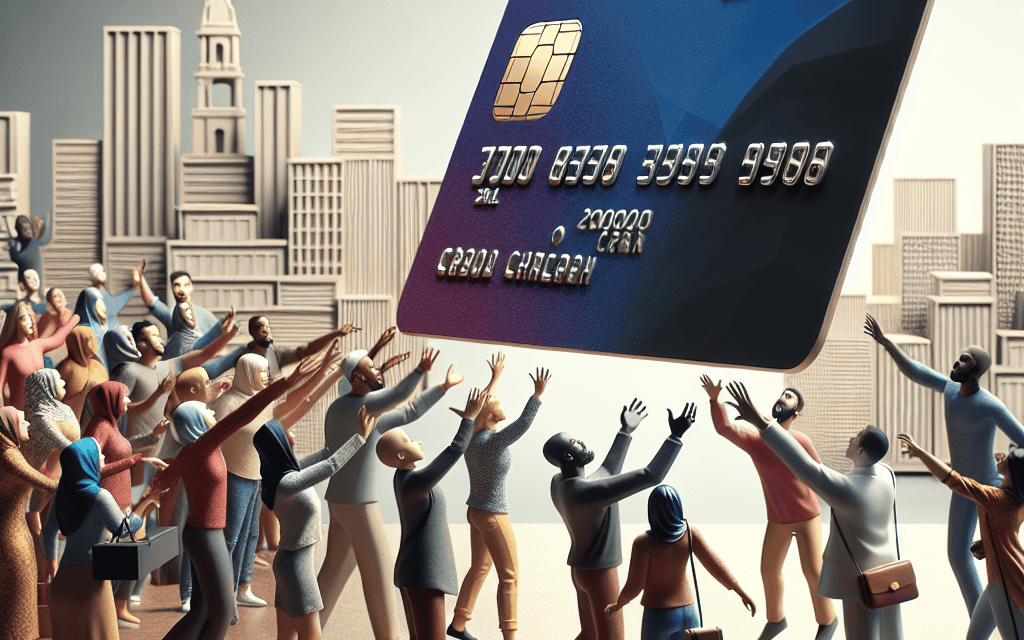“Empowering Possibilities: Zilch Up Expands Credit Access for All”
Introduction
Zilch, a leading innovator in the financial technology sector, has announced the launch of “Zilch Up,” a groundbreaking initiative aimed at expanding credit access for underserved markets. This new program is designed to address the financial inclusion gap by providing individuals in traditionally overlooked communities with the tools and resources necessary to build and improve their credit profiles. By leveraging advanced technology and data analytics, Zilch Up seeks to empower users with greater financial flexibility and opportunities, ultimately fostering economic growth and stability within these communities. Through this initiative, Zilch reaffirms its commitment to creating a more inclusive financial ecosystem, where everyone has the chance to achieve their financial goals.
Understanding Zilch Up: A New Era in Credit Access
Zilch, a prominent player in the financial technology sector, has recently unveiled its latest initiative, ‘Zilch Up,’ aimed at broadening credit access for underserved markets. This innovative program seeks to address the longstanding challenges faced by individuals who have traditionally been excluded from mainstream financial services. By leveraging cutting-edge technology and data analytics, Zilch Up promises to revolutionize the way credit is extended to those who need it most.
The introduction of Zilch Up comes at a time when financial inclusion is increasingly recognized as a critical component of economic development. Many individuals in underserved markets lack access to traditional credit facilities due to insufficient credit histories or the absence of formal financial records. This exclusion not only limits their ability to invest in personal growth opportunities but also hampers broader economic progress. Recognizing these challenges, Zilch has designed Zilch Up to bridge the gap between financial institutions and underserved communities.
Central to the Zilch Up initiative is the use of alternative data sources to assess creditworthiness. Unlike traditional credit scoring models that rely heavily on historical financial data, Zilch Up incorporates a wide array of non-traditional data points. These include utility payments, mobile phone usage, and even social media activity, which collectively provide a more comprehensive picture of an individual’s financial behavior. By doing so, Zilch Up enables a more inclusive approach to credit assessment, allowing individuals with limited credit histories to access financial products that were previously out of reach.
Moreover, Zilch Up is designed with a user-friendly interface that simplifies the credit application process. This is particularly important for individuals who may be unfamiliar with complex financial systems. The platform guides users through each step, ensuring that they understand the terms and conditions associated with their credit options. This transparency not only builds trust but also empowers users to make informed financial decisions.
In addition to expanding credit access, Zilch Up also emphasizes financial education. Recognizing that financial literacy is a key factor in successful credit management, the program offers a range of educational resources. These resources are tailored to the needs of underserved communities and cover topics such as budgeting, saving, and responsible borrowing. By equipping users with the knowledge they need to manage their finances effectively, Zilch Up aims to foster long-term financial stability.
Furthermore, Zilch Up’s commitment to responsible lending is evident in its approach to interest rates and repayment terms. The program offers competitive rates that are designed to be affordable for individuals in underserved markets. Additionally, flexible repayment options are available to accommodate varying financial circumstances. This ensures that users are not burdened by unmanageable debt, thereby promoting sustainable financial practices.
As Zilch Up continues to roll out across various regions, its impact is expected to be significant. By providing underserved individuals with access to credit, the program has the potential to unlock new economic opportunities and drive social mobility. Moreover, by setting a precedent for inclusive financial practices, Zilch Up may inspire other financial institutions to adopt similar approaches, thereby contributing to a more equitable financial landscape.
In conclusion, Zilch Up represents a bold step forward in the quest for financial inclusion. By harnessing the power of technology and data, Zilch is paving the way for a more inclusive credit system that benefits individuals and communities alike. As the program gains momentum, it holds the promise of transforming the lives of countless individuals who have long been excluded from the financial mainstream.
How Zilch Up Aims to Transform Underserved Markets
Zilch, a prominent player in the financial technology sector, has recently unveiled its latest initiative, ‘Zilch Up,’ designed to broaden credit access for underserved markets. This innovative program aims to address the longstanding challenges faced by individuals and small businesses in obtaining credit, particularly in regions where traditional financial services are either limited or inaccessible. By leveraging cutting-edge technology and data analytics, Zilch Up seeks to transform the financial landscape for these communities, offering them new opportunities for growth and economic empowerment.
The launch of Zilch Up comes at a critical time when the global economy is increasingly interconnected, yet disparities in financial access remain stark. Many individuals and small enterprises in underserved markets struggle to secure credit due to a lack of credit history or collateral, which are often prerequisites for traditional lending institutions. Recognizing these barriers, Zilch has developed a platform that utilizes alternative data sources to assess creditworthiness, thereby enabling a more inclusive approach to lending. This method not only expands the pool of potential borrowers but also reduces the risk for lenders by providing a more comprehensive view of an applicant’s financial behavior.
Moreover, Zilch Up is designed to be user-friendly and accessible, ensuring that even those with limited technological proficiency can navigate the platform with ease. The program offers a seamless application process, with quick approvals and transparent terms, which are crucial for building trust among users who may have previously been wary of financial institutions. By prioritizing user experience and transparency, Zilch Up aims to foster a sense of financial literacy and confidence among its users, empowering them to make informed decisions about their financial futures.
In addition to individual borrowers, Zilch Up also targets small businesses, which are often the backbone of local economies in underserved areas. These enterprises frequently face significant hurdles in accessing the capital needed for expansion or operational improvements. Through Zilch Up, small business owners can access tailored financial products that cater to their specific needs, enabling them to invest in growth opportunities and contribute to the economic vitality of their communities. This focus on small businesses not only supports local economies but also encourages job creation and innovation, further enhancing the program’s impact.
Furthermore, Zilch Up’s commitment to financial inclusion extends beyond merely providing credit. The program also offers educational resources and tools to help users better understand financial management and planning. By equipping individuals and businesses with the knowledge and skills necessary to manage their finances effectively, Zilch Up aims to create a sustainable model of economic empowerment that can drive long-term change in underserved markets.
As Zilch Up continues to roll out across various regions, its potential to transform underserved markets becomes increasingly evident. By addressing the root causes of financial exclusion and offering practical solutions, Zilch is setting a new standard for how fintech companies can contribute to social and economic development. The success of this initiative could serve as a blueprint for other organizations seeking to make a meaningful impact in similar contexts. Ultimately, Zilch Up represents a significant step forward in the quest to democratize access to financial services, paving the way for a more equitable and inclusive global economy.
The Impact of Zilch Up on Financial Inclusion
Zilch, a prominent player in the financial technology sector, has recently unveiled its latest initiative, ‘Zilch Up,’ aimed at broadening credit access for underserved markets. This innovative program is poised to make a significant impact on financial inclusion, a pressing issue that affects millions worldwide. By leveraging cutting-edge technology and a customer-centric approach, Zilch Up seeks to address the barriers that have traditionally hindered access to credit for individuals in underserved communities.
The launch of Zilch Up comes at a time when financial inclusion is increasingly recognized as a critical driver of economic development. Access to credit is a fundamental component of financial inclusion, enabling individuals to invest in education, start businesses, and improve their overall quality of life. However, many people, particularly those in low-income and marginalized communities, face significant obstacles in obtaining credit. These barriers often include a lack of credit history, stringent lending criteria, and limited access to traditional banking services.
Zilch Up aims to dismantle these barriers by utilizing advanced data analytics and machine learning algorithms to assess creditworthiness in a more inclusive manner. Unlike traditional credit scoring models that rely heavily on historical financial data, Zilch Up considers a broader range of factors, such as payment history on utility bills and mobile phone contracts. This approach allows the program to provide credit opportunities to individuals who may have been overlooked by conventional financial institutions.
Moreover, Zilch Up’s digital platform is designed to be user-friendly and accessible, ensuring that individuals with limited technological proficiency can easily navigate the application process. By offering a seamless and intuitive user experience, Zilch Up reduces the friction often associated with accessing financial services, thereby encouraging greater participation from underserved populations. Additionally, the platform provides educational resources to help users understand credit management and make informed financial decisions, further empowering them to take control of their financial futures.
The potential impact of Zilch Up on financial inclusion extends beyond individual consumers. By expanding credit access, the program can stimulate economic growth in underserved communities. Small businesses, which are often the backbone of local economies, stand to benefit significantly from improved access to credit. With the ability to secure financing, these businesses can invest in expansion, create jobs, and contribute to the overall economic vitality of their communities.
Furthermore, Zilch Up’s approach aligns with broader global efforts to enhance financial inclusion. Organizations such as the World Bank and the United Nations have long advocated for increased access to financial services as a means of reducing poverty and promoting sustainable development. By addressing the specific needs of underserved markets, Zilch Up contributes to these global objectives, demonstrating the potential of fintech solutions to drive positive social change.
In conclusion, the launch of Zilch Up represents a significant step forward in the quest for greater financial inclusion. By leveraging technology to provide credit access to underserved markets, Zilch Up not only empowers individuals but also fosters economic growth and development. As the program continues to evolve and expand, it holds the promise of transforming the financial landscape for millions, paving the way for a more inclusive and equitable future. Through initiatives like Zilch Up, the fintech industry can play a pivotal role in bridging the gap between the financially excluded and the opportunities they need to thrive.
Zilch Up: Bridging the Credit Gap for Underserved Communities

Zilch, a leading fintech company known for its innovative approach to financial services, has recently announced the launch of ‘Zilch Up,’ a new initiative aimed at expanding credit access for underserved markets. This development marks a significant step forward in addressing the financial inclusion challenges faced by many individuals and communities who have traditionally been overlooked by mainstream financial institutions. By leveraging cutting-edge technology and data analytics, Zilch Up seeks to bridge the credit gap and empower those who have been marginalized in the financial ecosystem.
The introduction of Zilch Up comes at a time when the need for inclusive financial solutions has never been more pressing. Despite advancements in financial technology, a substantial portion of the global population remains without access to basic credit facilities. This lack of access often stems from a variety of factors, including limited credit history, geographical constraints, and systemic biases within traditional credit scoring models. Recognizing these barriers, Zilch has designed Zilch Up to offer a more equitable and accessible pathway to credit.
Central to the Zilch Up initiative is the use of alternative data sources to assess creditworthiness. Unlike conventional credit scoring systems that rely heavily on historical credit data, Zilch Up incorporates a broader range of information, such as utility payments, rental history, and even social media activity. This holistic approach allows for a more comprehensive evaluation of an individual’s financial behavior, thereby enabling Zilch to extend credit to those who might otherwise be deemed ineligible by traditional standards. By doing so, Zilch Up not only enhances credit access but also promotes financial literacy and responsibility among its users.
Moreover, Zilch Up is designed with a user-friendly interface that simplifies the credit application process. Through its intuitive platform, users can easily navigate the steps required to apply for credit, track their application status, and manage their accounts. This ease of use is particularly beneficial for individuals who may be unfamiliar with financial products or who have previously encountered barriers when attempting to access credit. By removing these obstacles, Zilch Up empowers users to take control of their financial futures.
In addition to its innovative credit assessment model, Zilch Up also offers personalized financial education resources. These resources are tailored to meet the unique needs of underserved communities, providing users with valuable insights into managing credit, budgeting, and building a strong financial foundation. By equipping users with the knowledge and tools necessary to make informed financial decisions, Zilch Up fosters a culture of financial empowerment and resilience.
Furthermore, Zilch’s commitment to social responsibility is evident in its strategic partnerships with community organizations and non-profits. Through these collaborations, Zilch Up aims to reach a wider audience and ensure that its services are accessible to those who need them most. By working closely with local partners, Zilch can better understand the specific challenges faced by different communities and tailor its offerings accordingly.
In conclusion, the launch of Zilch Up represents a pivotal moment in the quest for financial inclusion. By expanding credit access to underserved markets, Zilch is not only addressing a critical gap in the financial landscape but also paving the way for a more inclusive and equitable future. As Zilch Up continues to evolve and expand its reach, it holds the promise of transforming the lives of countless individuals and communities, empowering them to achieve their financial goals and aspirations.
Key Features of Zilch Up and Their Benefits
Zilch, a leading fintech company known for its innovative approach to financial services, has recently launched a new initiative called ‘Zilch Up’ aimed at expanding credit access for underserved markets. This initiative is designed to address the financial inclusion gap by providing individuals with limited or no access to traditional credit systems an opportunity to build and improve their credit profiles. By leveraging advanced technology and data analytics, Zilch Up offers a range of key features that promise to deliver significant benefits to its users.
One of the primary features of Zilch Up is its user-friendly digital platform, which simplifies the process of applying for and managing credit. The platform is designed to be intuitive and accessible, ensuring that even those with minimal technological experience can navigate it with ease. This accessibility is crucial for reaching underserved populations who may not have had previous exposure to digital financial tools. Furthermore, the platform provides educational resources to help users understand credit management, thereby empowering them to make informed financial decisions.
In addition to its digital accessibility, Zilch Up employs a unique credit assessment model that goes beyond traditional credit scoring methods. By utilizing alternative data sources such as utility payments, rental history, and even social media activity, Zilch Up can evaluate an individual’s creditworthiness more comprehensively. This approach allows the platform to extend credit to individuals who might otherwise be overlooked by conventional financial institutions. Consequently, users who participate in Zilch Up can begin to establish a credit history, which is a critical step towards achieving financial stability and accessing more extensive financial services in the future.
Moreover, Zilch Up offers flexible credit products tailored to the needs of its users. These products include small, manageable lines of credit that can be used for everyday expenses or unexpected emergencies. The flexibility of these credit options ensures that users can access funds when they need them most, without the burden of high-interest rates or hidden fees. This feature is particularly beneficial for individuals in underserved markets who often face financial constraints and may not have access to emergency funds.
Another significant benefit of Zilch Up is its commitment to transparency and customer support. The platform provides clear and concise information about all terms and conditions associated with its credit products, ensuring that users are fully aware of their obligations. Additionally, Zilch Up offers robust customer support services, including live chat and phone assistance, to address any questions or concerns users may have. This level of support is essential for building trust with users who may be wary of financial services due to past negative experiences.
Furthermore, Zilch Up’s integration with other financial services offered by Zilch creates a seamless experience for users. By consolidating various financial tools within a single platform, users can manage their finances more efficiently and holistically. This integration not only enhances user convenience but also encourages responsible financial behavior by providing a comprehensive view of one’s financial health.
In conclusion, Zilch Up represents a significant step forward in expanding credit access for underserved markets. Through its user-friendly platform, innovative credit assessment model, flexible credit products, and commitment to transparency and support, Zilch Up offers a range of benefits that empower individuals to build their credit profiles and achieve greater financial inclusion. As Zilch continues to innovate and expand its services, initiatives like Zilch Up are poised to make a meaningful impact on the financial well-being of underserved communities worldwide.
Zilch Up’s Role in Empowering Financial Independence
Zilch, a prominent player in the financial technology sector, has recently unveiled its latest initiative, ‘Zilch Up,’ aimed at expanding credit access for underserved markets. This innovative program is designed to empower individuals who have traditionally been excluded from mainstream financial services, thereby fostering financial independence and inclusion. By leveraging cutting-edge technology and data analytics, Zilch Up seeks to bridge the gap between underserved communities and the financial resources they need to thrive.
The launch of Zilch Up comes at a time when financial inclusion is increasingly recognized as a critical component of economic development. Many individuals in underserved markets face significant barriers to accessing credit, often due to a lack of credit history or insufficient collateral. These barriers can perpetuate cycles of poverty and limit opportunities for economic advancement. Zilch Up addresses these challenges by offering a more inclusive approach to credit assessment, utilizing alternative data sources to evaluate creditworthiness. This approach not only broadens the scope of individuals who can access credit but also provides a more accurate reflection of their financial behavior and potential.
Furthermore, Zilch Up’s innovative platform is designed to be user-friendly and accessible, ensuring that individuals from all walks of life can easily navigate the process of applying for credit. The platform offers a seamless experience, from application to approval, with transparent terms and conditions that empower users to make informed financial decisions. By prioritizing transparency and ease of use, Zilch Up aims to build trust with its users, a crucial factor in encouraging engagement with financial services.
In addition to expanding credit access, Zilch Up also emphasizes financial education as a cornerstone of its mission. Recognizing that financial literacy is essential for making sound financial decisions, the program offers a range of educational resources and tools to help users better understand credit management and personal finance. These resources are tailored to meet the needs of diverse audiences, ensuring that individuals can build the knowledge and skills necessary to manage their finances effectively. By equipping users with the tools they need to succeed, Zilch Up not only facilitates access to credit but also promotes long-term financial stability and independence.
Moreover, Zilch Up’s commitment to social impact extends beyond individual empowerment. By enabling greater access to credit, the program has the potential to stimulate economic growth in underserved communities. Increased access to financial resources can lead to greater investment in local businesses, job creation, and overall economic development. As such, Zilch Up is not only a tool for individual empowerment but also a catalyst for broader societal change.
In conclusion, Zilch Up represents a significant step forward in the quest for financial inclusion and empowerment. By leveraging technology to expand credit access and promote financial literacy, the program addresses the systemic barriers that have long hindered underserved markets. Through its innovative approach, Zilch Up empowers individuals to achieve financial independence while contributing to the economic vitality of their communities. As the program continues to evolve, it holds the promise of transforming the financial landscape for underserved populations, paving the way for a more inclusive and equitable future.
Challenges and Opportunities in Expanding Credit Access with Zilch Up
Zilch, a prominent player in the financial technology sector, has recently unveiled its latest initiative, ‘Zilch Up,’ aimed at broadening credit access for underserved markets. This move comes at a time when financial inclusion is increasingly recognized as a critical factor in economic development. However, expanding credit access to underserved populations presents both challenges and opportunities that Zilch must navigate carefully.
One of the primary challenges in expanding credit access is the lack of traditional credit histories among underserved populations. Many individuals in these markets have limited or no interaction with formal banking systems, making it difficult for traditional credit scoring models to assess their creditworthiness. Zilch Up addresses this issue by leveraging alternative data sources, such as utility payments and mobile phone usage, to create a more comprehensive picture of an individual’s financial behavior. By doing so, Zilch Up can offer credit products to those who might otherwise be excluded from the financial system.
In addition to the challenge of assessing creditworthiness, there is also the issue of financial literacy. Many individuals in underserved markets may not have had the opportunity to develop a strong understanding of financial products and services. This lack of knowledge can lead to poor financial decisions and increased risk of default. To mitigate this risk, Zilch Up incorporates educational components into its platform, providing users with resources and tools to improve their financial literacy. By empowering individuals with the knowledge they need to make informed financial decisions, Zilch Up aims to foster a more sustainable and responsible borrowing culture.
Moreover, expanding credit access in underserved markets requires navigating regulatory environments that can vary significantly from one region to another. Zilch must work closely with local regulators to ensure compliance with relevant laws and regulations while also advocating for policies that support financial inclusion. This involves a delicate balance between adhering to existing frameworks and pushing for reforms that facilitate greater access to credit.
Despite these challenges, the opportunities presented by Zilch Up are substantial. By tapping into underserved markets, Zilch has the potential to reach millions of new customers, driving growth and profitability. Furthermore, by providing credit access to individuals who have been historically excluded from the financial system, Zilch Up can contribute to reducing economic inequality and promoting social mobility. This aligns with the broader trend of businesses increasingly recognizing the importance of social impact alongside financial performance.
Additionally, the use of technology in Zilch Up’s approach offers significant advantages. By utilizing advanced algorithms and machine learning, Zilch can continuously refine its credit assessment models, improving accuracy and reducing risk. This technological edge not only enhances the customer experience but also positions Zilch as a leader in the fintech space, setting a precedent for other companies looking to expand credit access.
In conclusion, while the launch of Zilch Up presents several challenges, it also offers a wealth of opportunities for both the company and the communities it serves. By addressing issues such as creditworthiness assessment, financial literacy, and regulatory compliance, Zilch is well-positioned to make a meaningful impact in underserved markets. As the initiative progresses, it will be crucial for Zilch to remain adaptable and responsive to the evolving needs of these communities, ensuring that Zilch Up fulfills its promise of expanding credit access and fostering financial inclusion.
Q&A
1. **What is Zilch Up?**
Zilch Up is a new initiative by Zilch aimed at expanding credit access to underserved markets.
2. **Who launched Zilch Up?**
Zilch, a financial technology company, launched Zilch Up.
3. **What is the primary goal of Zilch Up?**
The primary goal is to provide credit access to individuals in underserved markets who may have limited access to traditional credit services.
4. **How does Zilch Up aim to help underserved markets?**
Zilch Up aims to help by offering innovative credit solutions that cater to the needs of individuals who are often overlooked by traditional financial institutions.
5. **What problem does Zilch Up address?**
It addresses the problem of limited credit access for people in underserved markets, which can hinder their financial growth and stability.
6. **Who benefits from Zilch Up?**
Individuals in underserved markets who struggle to access traditional credit services benefit from Zilch Up.
7. **What makes Zilch Up different from traditional credit services?**
Zilch Up differentiates itself by using technology and innovative financial solutions to provide credit access to those who are typically excluded from conventional credit systems.
Conclusion
Zilch’s launch of ‘Zilch Up’ represents a significant step towards expanding credit access for underserved markets. By introducing this initiative, Zilch aims to provide financial opportunities to individuals who have traditionally been excluded from mainstream credit systems. ‘Zilch Up’ is designed to offer a more inclusive financial service, potentially improving financial literacy and economic participation among underserved communities. This move not only aligns with broader trends towards financial inclusivity but also positions Zilch as a forward-thinking company committed to addressing systemic barriers in the credit industry.





